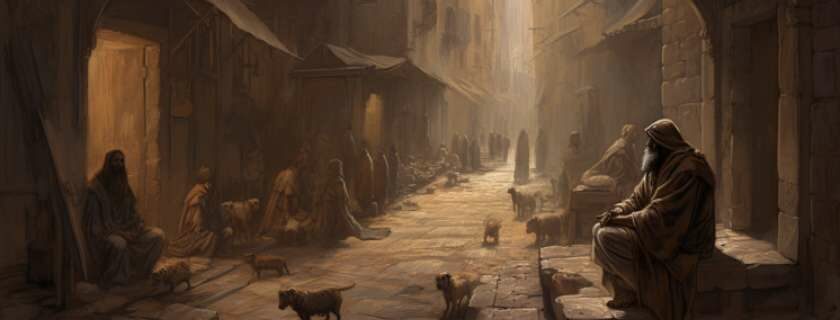We are all accustomed to expressions emphasizing the love of God. But, when we learn that God despises someone, we tend to get defensive or uneasy.
The apostle John states, “Because God so loved the world, that He gave His only Son, so that everyone who believes in Him would not perish, but have eternal life (John 3:16).” Nevertheless, there are instances in the Bible where God is portrayed as hating Esau, but these occurrences are infrequent and stem as a result of His sovereign decision to feel this way. Why did God hate Esau?
Romans 9:13 would not be difficult to believe if a period was added after the words “I have loved Jacob.” However, as we continue to read this Bible verse, we can sense tension, which concludes, “but it is Esau I detest[1].”
Key Takeaways
- The article explores God’s rare portrayal of hating Esau in the Bible, highlighting that it was a result of divine sovereignty rather than personal animosity.
- It delves into the complex relationship between Esau and Jacob, emphasizing key events such as the trade of Esau’s birthright and Jacob’s deception for his blessing.
- Lastly, it urges caution in using selective verses to justify hatred and encourages a broader understanding of love and empathy in religious teachings.
Contents
Who Is Esau?
Is Esau Jacob’s brother? Esau, Isaac, and Rebekah’s older twins were Abraham’s grandchildren (the younger was Jacob). Since “two countries are in your womb; one people will be stronger than the other, and the elder will serve the younger,” God explained to Rebekah why her pregnancy was challenging (Genesis 25:23). Esau, whose name means “hairy,” was born with that name.
Years later, when Jacob returned to Canaan, he worried that Esau might try to murder him and his family. He prayed to God for salvation and sent a costly gift before him (Genesis 32:9–15). “Esau went to greet Jacob and hugged him, wrapping his arms around his neck and kissing him, but he was mistaken about that. And they sobbed” (Genesis 33:4).
Because God had given them so many offspring, possessions, and livestock, they could not coexist in the same location, so Esau relocated to the Seir hill country, south of the Dead Sea (Genesis 36:7–8).
Despite the brothers’ reconciliation, Esau’s descendants—the Edomites, sometimes known as Idumeans—and Jacob’s—the Israelites—never got along. Edom frequently opposed Israel and engaged in combat with it.
The fact that the Israelites followed God and the Edomites were pagans played a significant role. The prophets Jeremiah and Obadiah predicted that the Edomites would eventually be wiped out and that God would “bring disaster on Esau” (Jeremiah 49:8).

What Was Esau And Jacob’s Relationship?
Jacob, whose name means “supplanter”—someone who deceives someone out of something for personal gain—was born gripping Esau’s heel. The twins’ birth narrative in the Bible contained a future prediction.
Because of his prowess as a hunter (Genesis 25:27), Esau won his father’s love. His mother favored Jacob. Esau took hunting very seriously and once returned from a hunt so exhausted and hungry that he believed he would pass away. He agreed to give up his birthright when Jacob begged because of his hunger and the enticing aroma of the red lentil stew his brother was making.
Isaac was appalled when Esau delivered his dinner and revealed that Jacob had tricked him. Esau resorted to complaining and begged his father for a favor. Esau would finally “throw [Jacob’s] yoke from off your neck,” was all father Isaac had to say.
This prophecy was realized as Esau’s descendants rebelled against Jacob’s descendants. Once their father passed away, Esau became so bitter that he made a promise to kill Jacob. Rebekah learned about the plan and intervened, telling Jacob to get away.

When Did God Hate Esau?
God did not hate Esau at birth. God also didn’t declare His hatred for Esau while he was still living. The house of Esau did not provoke God’s hatred until Jacob and Esau died. The longest prophecy is that of Obadiah. It reveals God’s curse against Edom and justifies His animosity toward Esau’s family.
“Because of your actions toward your brother Jacob, you will be shamed and permanently excluded (Obadiah 1:10).” This refers to the violence that Esau’s family, Edom, committed against Jacob’s house, Israel, after Esau and Jacob had both long since passed away, not any violence Esau may have personally committed against Jacob while they were both still living.
Both Obadiah and Malachi reflect on the several occasions when Edom organized a confederate attack on Israel to wreck them. God had pledged to watch over His people, so they could not be killed, but Edom was not given any mercy. When Esau (through the Edomites) despised God and his divine intentions through Israel, God hated Esau.
Why Did God Hate Esau?
The father of God’s chosen people, the Israelites, is Jacob, whom He later dubbed “Israel.” Esau, also known as “Edom,” was despised by God and was not chosen as the patriarch of His elect people. God blessed Esau and his offspring, the Edomites, in numerous ways.
Under the circumstances, God’s purpose for Jacob and hatred for Esau have nothing to do with human feelings of love and hate. It all concerns God favoring one man and his offspring while disfavoring another man and his offspring.
Esau’s offspring caused God’s curse to fall upon them, making Him angry forever. Israel is told in Genesis 27:29, “May people submit to you and nations serve you. Have dominion over your siblings, and may your mother’s sons submit to you. May those who curse you suffer the same fate as those who bless you.”

What Was Esau’s Sin?
Esau was dishonest in keeping his oath a secret from his father and sold his birthright to Jacob because he did not understand the value and rights of the firstborn. This is where God’s eternal judgment for them started.
As Esau returned from the field, he was worn out and asked Jacob, “Please let me eat a mouthful of that red thing there.” As a result, he was given the name Edom. Esau objected, saying, “Look, I’m going to die; what use is the birthright to me?” but Jacob insisted, “First sell me your birthright,” and then he gave him bread and lentil stew, which he ate and drank before getting up and leaving. As a result, Esau hated his birthright (Genesis 25:29–34).
Esau screamed a loud and harsh cry when he heard his father’s remarks. Esau responded, “Is he not appropriately named Jacob, for he has betrayed me these two times? He took away my birthright, and lo, he has taken away my blessing.” He asked, “Have you not saved a blessing for me?” His father then stated, “Your brother came deceitfully and has taken away your blessing (Genesis 27:34–36).”
Was God’s Hatred Fair?
Esau was a sinner, simply put. He was considerably straighter and more honest than his brother Jacob, but he was still guilty in God’s eyes. Hence, it is not a matter of fairness that God chose Jacob to receive the gift of grace while also choosing to judge Esau.
Esau deserved God’s wrath, that much is certain. No sinner who perishes and is damned will ever contest God’s eternal dominion or declare Him to be unjust. Every sinner who experiences judgment will recognize that they earned it. God is generous and gracious in saving sinners like Jacob, but He is also righteous in passing over individuals like Esau.

Summary
Sometimes we intentionally use very selective words when talking about God and Jesus Christ. Claiming that God hates certain people in the same manner that people occasionally hate one another can be taken as a license to do the same. However, God loves all of us.
If we use verses like Malachi 1:1–3 or Romans 9:13 to support our hatred, we remove the verse from its context and interpret it differently than the Christian community. God might say, “Don’t use Me to justify your hatred. Take ownership of your behavior. Reject hatred and come to your senses.”
Frequently Asked Questions
What happened to Esau’s descendants?
Esau’s descendants, the Edomites, were prominent in the ancient Near East, known for their expertise in metallurgy and trade. However, they faced conflicts and migrations over time, leading to their assimilation into other cultures and disappearance from historical records.
Despite their once-prominent presence, the ultimate fate of Esau’s descendants remains a subject of scholarly debate.
What is the lesson behind the story of Jacob and Esau?
The story of Jacob and Esau teaches valuable lessons about family dynamics, sibling rivalry, and the repercussions of deceit. It underscores the importance of honesty and integrity in relationships, while cautioning against greed and impulsive decisions.
Ultimately, it highlights the potential for forgiveness, redemption, and reconciliation, even amidst conflict and betrayal.
What was the prophecy about Esau?
The prophecy regarding Esau forecasted greatness for his descendants, including rulers emerging from his lineage, but also predicted conflicts with neighboring nations and a subsequent decline in power and influence, symbolized by the eventual subjugation of the Edomite kingdom.
Were the descendants of Esau known as Edomites?
Yes, Esau’s descendants were known as the Edomites. The name “Edom” originates from Esau’s Hebrew nickname, meaning “red,” a reference to the stew for which he traded his birthright.
They inhabited the region south of the Dead Sea and were prominent in trade and metallurgy, frequently mentioned in ancient texts alongside the Israelites in various interactions and conflicts.

very well said.